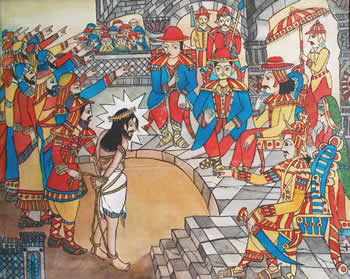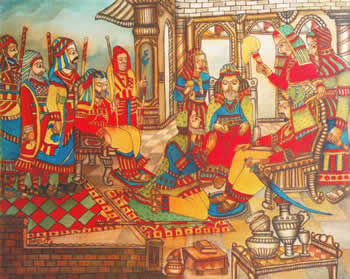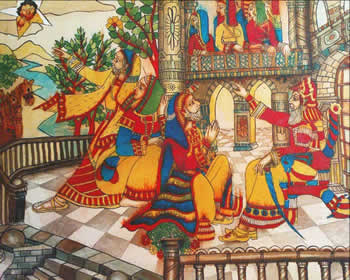"Yes, I am a King"
The Anti-Politics of Christ the King
For Sunday November 25, 2012
Lectionary Readings (Revised Common Lectionary, Year B)
2 Samuel 23:1–7 or Daniel 7:9–10, 13–14
Psalm 132:1–12, (13–18) or Psalm 93
Revelation 1:4b–8
John 18:33–37
The last Sunday of the liturgical year celebrates "Christ the King." The explicitly political language of the readings this week points to a profound paradox. Although much of Scripture is political, it isn't very interested in politics.
In his new book In God's Shadow; Politics in the Hebrew Bible (Yale, 2012), Michael Walzer says that he reads the Hebrew Bible like "an ordinary reader." He's professor emeritus at Princeton's Institute for Advanced Study, and one of the country's leading political theorists. And although he says that he has only a school boy's knowledge of Hebrew, he's been reading the Bible for over seventy years. As a political theorist, Walzer is especially interested in the relationship between politics and the people of God.
 |
Jesus Before Pilate. |
His book's most provocative thesis is that while the Hebrew Bible contains a lot about politics, it isn't really interested in politics. Rather, it commends what Walzer calls a radical anti-politics. Since God is sovereign, caesar is secondary. The prophets, for example, are poets of social justice and Israel's most important form of public speech, but they're not political activists with any program. With their emphasis on divine intention as opposed to human wisdom, the prophets exemplify the Hebrew Bible's "radical denial of the doctrine of self-help." The prophets "disdain" politics. In contrast to Greek philosophers, "the Biblical writers never attach great value to politics as a way of life." Politics is simply "not recognized by the Biblical writers as a centrally important or humanly fulfilling activity" (125, 186).
The gospel this week records the most dramatic political confrontation in all of Scripture — Pontius Pilate's interrogation of Jesus in the praetorium, his three-fold declaration that he found him innocent, then his death sentence verdict to pacify the mob, mock the Jews, and protect his job. For John the passion narrative in general and the trial before Pilate in particular were political rather than religious crises. Jesus's trial and Roman execution epitomized a clash between two kings and two kingdoms, and the allegiance that they both solicit from us.
The birth of Jesus signaled that God would "bring down rulers from their thrones" (Luke 1:52). In Mark's gospel the very first words that Jesus spoke announced that "the kingdom of God is at hand" (1:15). John's gospel takes us to the death of Jesus, and the political theme is the same. Jesus was dragged to the Roman governor's palace for three reasons, all political: "We found this fellow subverting the nation, opposing payment of taxes to Caesar, and saying that He Himself is Christ, a King" (Luke 23:1–2).
Pilate met the angry mob outside the praetorium, then grilled Jesus alone back inside. "Are you the king of the Jews?"
"My kingdom is not of this world," Jesus replied. "My kingdom is from another place."
"You are a king, then!" mocked Pilate.
"Yes, you are right in saying that I am a king."
Pilate went back outside, declared that Jesus was innocent, then had his soldiers beat, flog, and humiliate him with purple robes and a crown of thorns befitting a man whom he miscalculated was a political poser: "Hail, O king of the Jews!"
Back outside, the mob hounded Pilate: "If you let this man go, you are no friend of Caesar. Anyone who claims to be a king opposes Caesar." Pilate thus found himself sandwiched between angering the mob and betraying his emperor.
He caved in: "Here is your king. Shall I crucify your king?"
"We have no king but Caesar!"
 |
King Augustus. |
When Pilate crucified Jesus, he insulted the Jews one last time by fastening a notice to the cross, written in Aramaic, Latin, and Greek, that he knew they would find repugnant: "Jesus of Nazareth, King of the Jews." They objected, of course: "Don't write 'The king of the Jews,' but that this man claimed to be king of the Jews."
It was too late: "What I have written, I have written," said Pilate. To be sure, with his mockery of the Jews he wrote much more than he ever could have imagined (John 18:28–19:22).
In his commentary on Acts (Brazos, 2006), the Yale historian Jaroslav Pelikan observes that just as pagans accused the earliest believers of cannibalism because of their eucharistic practices, they also accused them of sedition because of the overt political implications of their confession of a "kingdom of God" and a "citizenship in heaven" (Philippians 3:20). By confessing Jesus as lord, they rejected caesar as king. Fidelity to Christ the king was absolute and unconditional, whereas loyalty to the Roman state was relative and conditional.
Charges of political sedition dogged the early Christians. In his little book The Christians as the Romans Saw Them (1984), the historian Robert Louis Wilken demonstrates the broad and deep antipathy toward the early Christians. For many years Christians were invisible to most people in the Roman empire. But across the decades they earned a reputation as an alternate and anti-social community that existed on the margins of the state. They were fringe people.
Christians were thought to be fanatical, seditious, obstinate, and defiant. Tacitus called them "haters of mankind." They scorned long-held Roman religious traditions. They didn't go to the games. Many of their adherents came from the lower classes and seemed gullible. They refused military service, and met for clandestine rites rumored to include cannibalism, ritual murder, and incest. In the Octavius by the Roman lawyer Minucius Felix, written in the early third century, a pagan critic complains that the Christians "do not understand their civic duty." Their indifference to civic affairs undermined society.
For their part, the early believers used two graphic images to picture the Roman state. Rome was a ferocious dragon that stood in front of a woman giving birth in order to "devour" the newborn son who would rule all the nations. Rome was also a whore "drunk with the blood of the saints" (Revelation 11-13, 17). And so in her book Revelations; Visions, Prophecy, and Politics in the Book of Revelation (2012), Elaine Pagels describes Revelation as a piece of "anti-Roman propaganda."
When Jesus said that his kingdom was "not of this world" he didn't mean that it was merely spiritual, or relegated to a future age beyond history or in heaven.
The kingdom of God that Jesus announced and embodied is what life would be like on earth, here and now, if God were king and the rulers of this world were not (Borg, Crossan). The political, economic, and social subversions would be almost endless — peace-making instead of war mongering, liberation not exploitation, sacrifice rather than subjugation, mercy not vengeance, care for the vulnerable instead of privileges for the powerful, generosity instead of greed, humility rather than hubris, embrace rather than exclusion.
 |
The King Herod. |
The apocalyptic visions in this week's Old Testament reading from Daniel trace the rise and fall of the greatest political kingdoms in human history — Babylon, Persia under Cyrus the Great, Greece under Alexander the Great, and then Rome. Above and beyond them all, though, Daniel foretells of a king and a kingdom that is not ethnically, spatially or temporally limited; it is "an everlasting dominion that will not pass away, and will never be destroyed." Rather than an ethnocentric kingdom limited to one land and one people, this kingdom welcomes "all peoples, nations and men of every language" to worship the one true "ruler of the kings of the earth" (Daniel 7:14–15; Revelation 1:5).
The Lord's Prayer, then, just might be the most subversive of all political acts: "Thy kingdom come, thy will be done, on earth as it is in heaven." People who live and pray this way have a very different agenda than caesar's, whether Republican or Democrat, whether capitalist, socialist or communist, whether democratic or theocratic. Why? Because they've entered a kingdom, pledged their allegiance to a ruler, and submitted to the reign of Christ the King.
For further reflection:
Consider the poem of Origen (185–254), from Against Celsus, Book VIII, Chapter 73:
And as we — by our prayers —
vanquish all the demons that stir up war,
and lead to the violation of oaths,
and disturb the peace,
we in this service
are much more helpful to the kings
than those who go into the field
to fight for them.And we do take our part in public affairs,
when along with righteous prayers,
we practice self-denying disciplines and meditations,
which teach us to despise pleasures,
and not to be lead astray by them.
And none fight better for the king
[and his role of preserving justice]
than we do.
We do not indeed fight under him,
although he demands it;
but we fight on his behalf,
forming a special army of piety
by offering our prayers to God.
The three images this week are all by Bhanu Dudhat, Dudhat Art Gallery.
Image credits: (1–3) Dudhat Art Gallery.





